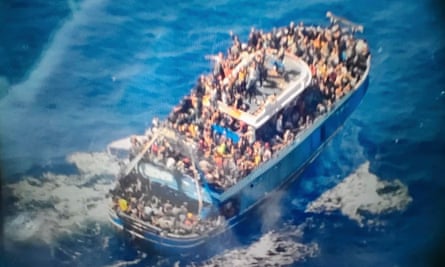A Greek court has thrown out charges against nine Egyptian men accused of causing one of the Mediterranean’s deadliest shipwrecks, ruling it has no jurisdiction over the case because the disaster was in international waters.
The three-member tribunal, sitting in the southern city of Kalamata, announced the decision as migrant solidarity supporters rallied outside in support of the defendants. Inside the courtroom there was applause and whoops of delight.
“After almost a year of wrongful detention these nine men can now enjoy their freedom,” said Alexandros Georgoulis, one of their lawyers. “This is a very important ruling that will set a precedent when it comes to judging cases that take place in international waters. It is an outcome that has made us all very happy.”
An estimated 600 people died when the Adriana, an ageing fishing trawler believed to be carrying as many as 750 migrants from Libya to Italy, capsized in international waters off the Greek town of Pylos on 14 June last year.
The accused were among the 104 survivors, all men. They had been held in pre-trial detention ever since, charged with migrant smuggling and illegal entry into Greece, participating in a criminal organisation and provoking a deadly shipwreck – accusations carrying multiple life sentences. From the outset, the Egyptians, aged between 20 and 40, denied being involved in the doomed smuggling operation.
On Tuesday, judges not only upheld the defence lawyers’ objection that the court lacked the jurisdiction to try the case but threw out two of the four offences the suspects had faced.

“The court not only agreed it was incompetent to try the case but found the defendants innocent of illegal smuggling and illegal entry [into Greece],” said Georgoulis, speaking outside the courtroom. “That really wasn’t expected.”
Vicky Aggelidou, a defence lawyer representing two of the accused men, said: “It was a heroic decision that was absolutely right, absolutely fair and should have been taken long ago. There was no evidence against them. They were paying customers who, like others onboard, had waited for weeks in Libya to board the ship to make a journey that they hoped ultimately would only improve their lives. They were never part of a smuggling ring.”
The Egyptians, who have since applied for asylum, would almost certainly seek compensation for the time they had spent in prison, Aggelidou said.
Images of passengers on the overcrowded vessel were circulated across the world, prompting global outrage over whether the Hellenic coastguard, first alerted to the ship after it ran into engine trouble about 15 hours before the tragedy, could have done more to prevent the disaster.
Victims who had boarded the boat in Libya included Pakistanis, Syrians, Egyptian and Palestinian people. It soon emerged that women and children had been locked in the hold of the trawler. The ship sank in one of the deepest areas of the Mediterranean. Only 82 bodies have been recovered.
Before Tuesday’s hearing, concerns had been widespread as to whether the Egyptians would be given a fair trial. “It was clear from the start that these people were picked randomly and used as scapegoats to cover up a disaster that the Greek coastguard was entirely responsible for,” said Stelios Kouloglou, a Greek Left MEP who was in Kalamata to attend the judicial proceedings. “Today’s judgment is very positive but justice still has to be done. This was a huge tragedy and an investigation must be conducted to find the real culprits.”
Greek officials say authorities were unable to act earlier because the vessel was in international waters. Although a parallel investigation into the conduct of the Hellenic coastguard is under way, maritime officials have rebuffed allegations they deliberately failed to intervene for fear of such a large group of asylum seekers being brought ashore. They have instead claimed that while a vessel was dispatched, the stricken boat’s crew members repeatedly turned down offers of help saying: “No help … [we] got Italy.”
But groups supporting the rights of survivors and migrants dispute that version of events.
In a report released in December, the EU border agency, Frontex, which had spotted the boat from the air before the coastguard, alluded to dereliction of duty, saying Greek authorities failed to reply to follow-up calls and its own offers of help.
Survivors claim coastguard officers caused the vessel to capsize after an ill-fated attempt, made hours after the boat was first located, to tow the trawler. Last September, they took those claims further, filing a lawsuit accusing Greek authorities of deliberately failing to rescue those onboard.
Source: theguardian.com


















